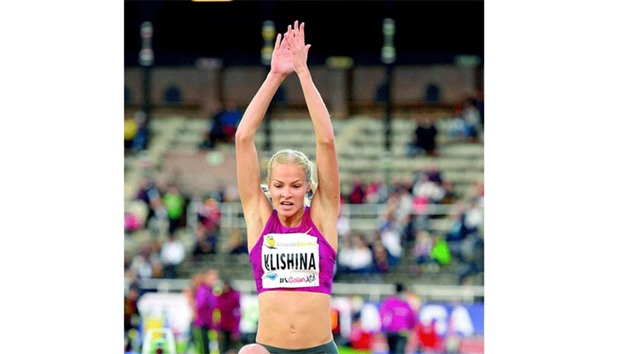Russian long jumper Darya Klishina was ecstatic when word came through that athletics’ ruling body had cleared her to compete at the Rio Olympics despite a blanket ban on the country’s track and field team.
But the bad news was that US-based Klishina was the only one of 68 Russian Olympic hopefuls given the green light by the IAAF — and soon her joy turned sour as the ruling unleashed a torrent of bile.
A Facebook post Klishina, 25, published Sunday thanking the IAAF for ruling she could compete as a neutral was flooded with nearly 1,000 comments, including calls for her to give up her Russian passport, never return home and fail miserably in Rio.
“My agent, my family told me right away, ‘Don’t go online, don’t read anything, don’t watch, just do what you do — train, prepare for the Olympic Games,’” Klishina told AFP from her training base in Florida.
“Regular people unfortunately saw something criminal... and started accusing me of being an enemy of the Motherland.”
The abuse was not just confined to anonymous Internet trolls.
A pro-Kremlin journalist equated her to a Nazi collaborator and a spokesman for Russia’s equivalent of the FBI said she was on the same level as whistleblower runner Yulia Stepanova and the former head of the Russian anti-doping lab Grigory Rodchenkov, who have become outcasts for exposing doping in Russian athletics.
Last month the IAAF ruled to uphold a ban on Russia’s entire track and field team over evidence of state-sponsored doping but left the door ajar for some athletes to go to Rio next month as neutrals.
The criteria were tough and Klishina — the only Russian athlete to live and train full time abroad — was the only member who could prove she was totally outside Russia’s badly tainted system.
That left stars like pole vaulter Yelena Isinbayeva and world champion hurdler Sergey Shubenkov still facing the prospect of missing out on Rio.
Isinbayeva’s coach Yevgeny Trofimov told Russian television that Klishina’s gratitude toward IAAF was “humiliating”.
The last remaining hope for the rest of the Russian team lies with the Court of Arbitration for Sport (CAS), which is expected to rule on an appeal against the IAAF’s blanket ban by July 21.
Despite getting her clearance to compete Klishina insists that she is desperate to see the complete ban overturned and all her teammates allowed to compete.
“I’m also waiting for the (CAS) decision along with the whole team,” she told AFP.
“I hope that we can all go together under the Russian flag.”
Klishina was already based at the prestigious IMG Academy in Bradenton, Florida, when the Russian doping scandal first emerged in a German television documentary in December 2014.
Trying to pull herself out of a rut after a seventh-place finish at the 2013 World Championships in Moscow, Klishina followed her American coach to Florida and decided to remain.
Klishina says that she escaped the IAAF ban through good fortune given that she could have been barred from Rio along with her teammates had she decided three years ago to stay at home.
“It just happens that right now my coach is an American,” she said.
Although the IAAF has cleared Klishina to take part in international competition, the International Olympic Committee (IOC) still has to accept her participation and determine whether she will be included on the Russian Olympic team, her agent Alexei Nikolaev told AFP.
IOC president Thomas Bach said that if she does go, Klishina should be allowed to run under the Russian flag.
Klishina says that she has the support of her teammates and some top officials have spoken out to give her their backing.

Darya Klishina
